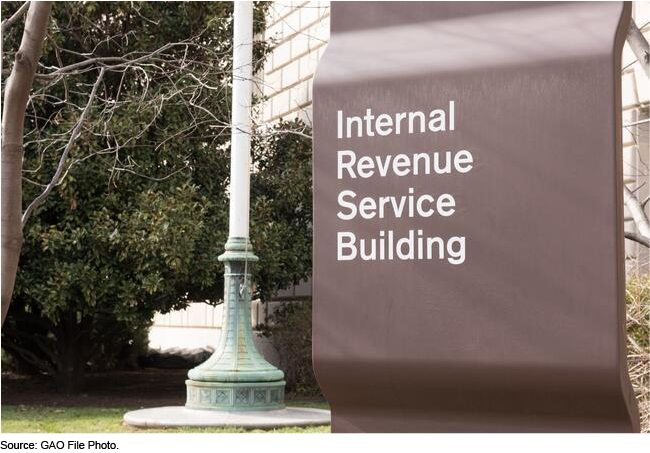Financial Audit: IRS's FY 2020 and FY 2019 Financial Statements
Fast Facts
In FY20, the IRS collected over $3.5 trillion in taxes, which makes up most of the federal government's revenues. Accordingly, the IRS's financial management is important to Congress and taxpayers.
We audit the IRS's financial statements each year and issue an opinion on them, as well as on the effectiveness of the IRS's internal controls (e.g., its ability to ensure that transactions are properly authorized and recorded).
In FY20, we found that the IRS's financial statements were reliable and its controls over financial reporting were effective, although the IRS could improve its controls over unpaid taxes and financial reporting systems.

Highlights
What GAO Found
In GAO's opinion, the Internal Revenue Service's (IRS) fiscal years 2020 and 2019 financial statements are fairly presented in all material respects, and although certain controls could be improved, IRS maintained, in all material respects, effective internal control over financial reporting as of September 30, 2020. GAO's tests of IRS's compliance with selected provisions of applicable laws, regulations, contracts, and grant agreements detected no reportable instances of noncompliance in fiscal year 2020.
Limitations in the financial systems IRS uses to account for federal taxes receivable and other unpaid assessment balances, as well as other control deficiencies that led to errors in taxpayer accounts, continued to exist during fiscal year 2020.These control deficiencies affect IRS's ability to produce reliable financial statements without using significant compensating procedures. In addition, unresolved information system control deficiencies from prior audits, along with application and general control deficiencies that GAO identified in IRS's information systems in fiscal year 2020, placed IRS systems and financial and taxpayer data at risk of inappropriate and undetected use, modification, or disclosure.
IRS continues to take steps to improve internal controls in these areas. However, the remaining deficiencies are significant enough to merit the attention of those charged with governance of IRS and therefore represent continuing significant deficiencies in internal control over financial reporting related to (1) unpaid assessments and (2) financial reporting systems. Continued management attention is essential to fully addressing these significant deficiencies.
The CARES Act, enacted in March 2020, and other COVID-19 pandemic relief laws contained a number of tax relief provisions to address financial stress caused by the COVID-19 pandemic. For example, the Economic Impact Payments provisions in the CARES Act provided for direct payments for eligible individuals to be implemented through the tax code. Implementing the provisions related to these Economic Impact Payment required extensive IRS work, and resulted in it issuing approximately $275 billion in payments as of September 30, 2020. IRS faced difficulties in issuing these payments as rapidly as possible, such as in identifying eligible recipients, preventing improper payments, and combating fraud based on identity theft. IRS discusses the challenges in carrying out its responsibilities under the CARES Act in its unaudited Management's Discussion and Analysis, which is included with the financial statements. As part of monitoring and oversight of the federal government's efforts to prepare for, respond to, and recover from the COVID-19 pandemic, GAO has issued a number of reports on federal agencies' implementation of the CARES Act and other COVID-19 pandemic relief laws, including reports providing information on, and recommendations to strengthen, IRS's implementation of the tax-related provisions.
Why GAO Did This Study
In accordance with the authority conferred by the Chief Financial Officers Act of 1990, as amended, GAO annually audits IRS's financial statements to determine whether (1) the financial statements are fairly presented and (2) IRS management maintained effective internal control over financial reporting. GAO also tests IRS's compliance with selected provisions of applicable laws, regulations, contracts, and grant agreements.
IRS's tax collection activities are significant to overall federal receipts, and the effectiveness of its financial management is of substantial interest to Congress and the nation's taxpayers.
Recommendations
Based on prior financial statement audits, GAO made numerous recommendations to IRS to address internal control deficiencies. GAO will continue to monitor, and will report separately, on IRS's progress in implementing prior recommendations that remain open. Consistent with past practice, GAO will also be separately reporting on the new internal control deficiencies identified in this year's audit and providing IRS recommendations for corrective actions to address them.
In commenting on a draft of this report, IRS stated that it continues its efforts to improve its financial systems controls.
